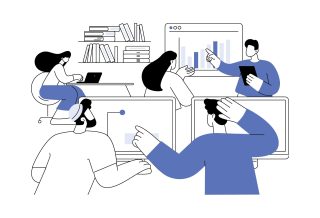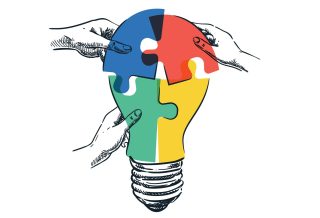IDEAS
Equity in pre-K classrooms
By Helen Barahal and Humberto Cruz
Categories: Continuous improvement, Learning communities, Learning designs, Learning systems/planning, Online learning, Reaching all students, School leadershipOctober 2020
Vol. 41, No. 5
Read the remaining content with membership access. Join or log in below to continue.
Sed ut perspiciatis unde omnis iste natus error sit voluptatem accusantium doloremque laudantium, totam rem aperiam, eaque ipsa quae ab illo inventore veritatis et quasi architecto beatae vitae dicta sunt explicabo. Nemo enim ipsam voluptatem quia voluptas sit aspernatur aut odit aut fugit, sed quia consequuntur magni dolores eos qui ratione voluptatem sequi nesciunt. Neque porro quisquam est, qui dolorem ipsum quia dolor sit amet, consectetur, adipisci velit, sed quia non numquam eius modi tempora incidunt ut labore et dolore magnam aliquam quaerat voluptatem.
What learning looks like
New Teacher Center designed many of the activities for the site coordinator professional learning and shared drafts with us for input. In one of our first sessions, New Teacher Center previewed a role-play scenario that they wanted to use.
The scenario portrayed a teacher and a coach debriefing something that had happened in the classroom. The pre-K students had been working on self-portraits. One child reached for a light brown crayon for her portrait. Another student stopped her and said, “That color is too light for you.” The student handed her a darker brown crayon and giggled. In the role-play, the coach asks the teacher about their response in the moment.
When we initially shared the scenario, the room got quiet. Questions and concerns emerged about elevating race: Was it too early in the year? Would it overshadow the coaching strategies being taught? It was a critical moment for Leader Learning Lab and the collaboration. We knew it was essential to be able to have explicit conversations about race.
In that moment, we allowed people to share, process, and ask critical questions. The group was able to name how racial inequity is perpetuated when we do not give it voice. We were able to connect this imperative with the Division of Early Childhood Education’s mission and the Early Childhood Framework for Quality, and anchor the conversation in the needs of New York City’s children.
We ultimately used the role-play in the first Leader Learning Lab session. Site coordinators later said that they appreciated the role-play’s authenticity, as well as the opportunity to discuss with New Teacher Center’s facilitators and their peers.
References
Horng, E., Klasik, D., & Loeb, S. (2010). Principals’ time use and school effectiveness. American Journal of Education, 116(4), 491-523.
U.S. Department of Education Office for Civil Rights. (2014, March). Civil rights data collection: Data snapshot: Early childhood education. www2.ed.gov/about/offices/list/ocr/docs/crdc-early-learning-snapshot.pdf.
Helen is executive director, teaching and learning programs, in New York City Department of Education’s Division of Early Childhood Education.
Categories: Continuous improvement, Learning communities, Learning designs, Learning systems/planning, Online learning, Reaching all students, School leadership
Recent Issues
LEARNING DESIGNS
February 2025
Read the remaining content with membership access. Join or log in below to...
BUILDING BRIDGES
December 2024
Read the remaining content with membership access. Join or log in below to...
CURRICULUM-BASED PROFESSIONAL LEARNING
October 2024
Read the remaining content with membership access. Join or log in below to...
LEARNING TO PIVOT
August 2024
Read the remaining content with membership access. Join or log in below to...












